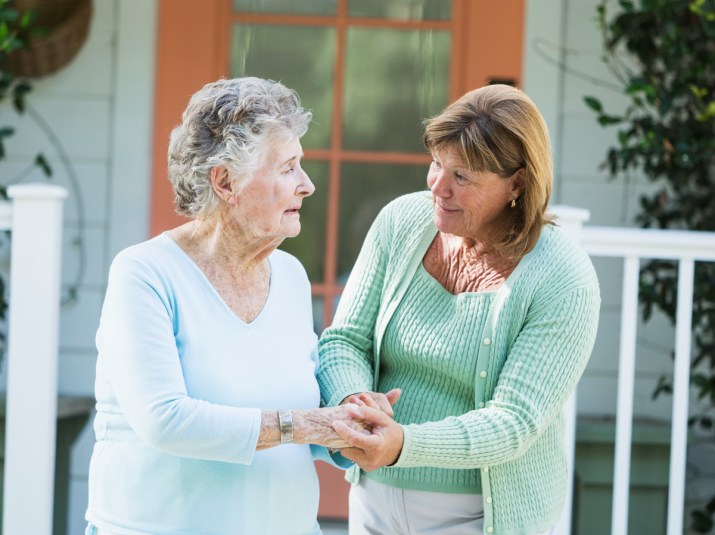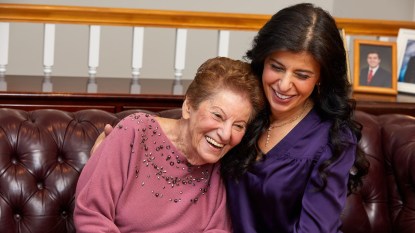Must-Read Advice from Women Who’ve Cared for Aging Parents

Lisa Krohn, Mary Herlihy*, and Jennifer Galluzzo all found themselves playing a central role in planning their parents end-of-life care. Though each scenario was quite different, the experience taught them to appreciate life even more. Like the author Rick Riordan says, “Life is only precious because it ends.”
On one side of the spectrum, Lisa’s parent’s were very involved in the whole process from the get-go. “I have the distinction of having the only parents of anyone I have ever met that were forward-thinking in every way,” she says. When Lisa was just 12 years old, her parents took her to the site where they would be buried, and they continued to teach her about things like long-term health care and writing a will as she grew up. They decided on their own to move into an assisted living home, doing “100 percent of the work,” says Lisa. They chose a location that was optimal for them, where they could maintain an active social life.
When Jennifer’s 92-year-old father-in-law could no longer maintain independent living after his wife passed, she and her husband decided the best scenario would be for “Grampy” to move in with them and their three children in a private in-law style apartment. Because of an earlier stint in a rehab facility, they knew he would not thrive with the structure built into an assisted living facility. So they hired a trusted nurse to live with them 24/7, and the set-up has been going strong for three years since. “He feeds off the energy of the kids, and he even likes the dog and cat,” says Jennifer. “He teaches us how to cook his secret recipes. He also has a sense of normalcy in his life, living in a house with people he knows and loves.”
Finally, Mary, a hospice nurse, became the primary caregiver for her mother, Kathleen, who lived in her own home down the street until she passed away at the age of 93. “I could stop in and fix her breakfast, get her settled and then go home,” says Mary. “I cooked dinner for my family and brought a plate over for my mom. I was able to stop in for short visits or long visits as needed. This truly helped with avoiding the isolation that so many older people experience.” Also, living on her own, Kathleen was able to foster independence, deciding her own schedule, including when to eat, sleep, and wake up. “When she needed my help, we could discuss a mutual time based on my availability and her needs,” says Mary. “This is not always possible with facility living.”
Each family settled on a plan that worked best for their unique situation, but despite being different from one another, they each came with similar challenges and rewards. Planning for healthcare and home aid is a cumbersome process, filled with lots of details and conversations that can be uncomfortable. But all three women agreed that the lessons, love, and rewards they have experienced far outweigh the struggles. Their stories attest to the fact that witnessing a parent’s journey can be life-changing — see their advice below.
Be Present
In the last four years of her parents’ lives, Lisa found herself “organically sitting and witnessing [them] where they were.” Some days, she would spend up to 12 hours with them, and quickly realized that being fully present was the best gift she could give them — and herself . “I found a grace, civility and elegance internally with myself,” she says. “I became patient, empathetic with everyone I met, professionally and personally.”
In order to be fully present, try hiding all distractions (including cell phones), taking deep breaths, and focusing on the feel of your feet as they are planted on the ground. This will help you to focus on only the exact moment you are in. It gets easier with practice.
Smile Often
A smile is a powerful gesture that can brighten anyone’s day. When Lisa noticed this during her visits to her parents’ nursing home, she made a commitment to smile more often. Put simply, she practiced smiling to herself, to strangers throughout New York City, and to the other residents within her parents’ nursing home. She remembers how they embraced her warmth time and time again. “You see [the] appreciation in their eyes and it’s a poignant and life-affirming experience.” Challenge yourself to smile more often and take note of how it affects not others, but you as well.
Remember Family
Sometimes life and its chaos can distract us from focusing on what is most important. Details, planning, and difficult decisions can be at the forefront of caring for aging parents, but Jennifer reminds us of the meaning behind all of it. “Family is everything,” she says. “If Grampy hadn’t moved in, he probably would not be here today. Our children would never have had the opportunity to learn so much from him and so much about him. From their growling matches to the dance recitals they put on for him, it is just an amazing relationship. The love we see in their eyes makes the challenges seem like nothing.”
Caring for an aging parent is work and, yes, there will be frustrations along the way. But like everything else in life, the challenges are temporary. In the words of the great Michael J. Fox, “Family is not an important thing, it is everything.” Sometimes a concrete reminder can help you to maintain this perspective. Hang up a decorative sign about family or put your favorite family photos in prominent places around your home.
Embrace Being Needed
Mary fondly remembers how happy her mother was to see her if she ever spent a few days away. “I knew she appreciated me” she says. “When I got back I could visibly see from the smile on her face that she was glad I was home. It’s very gratifying to feel so needed and appreciated.” Jennifer shares this sentiment. “The feeling of giving back is amazing,” she says. “[My father] did so much for his family and our country in WWII — it just seems like the right thing to do.”
The bond you have with your parents is irreplaceable and unforgettable, and taking care of them in their twilight years can help you grow as a person, too. “I became more evolved, patient, empathetic with everyone I met professionally and personally,” says Lisa. “I became a better citizen of the world because of this experience.”
*Name has been changed at the request of the source.
More From FIRST
How I Learned to Accept Help After My Husband Got Sick
What Women in the Sandwich Generation Often Miss About Their Own Happiness
How to Kindly and Effectively Talk to an Older Relative About Giving Up the Keys for Good













